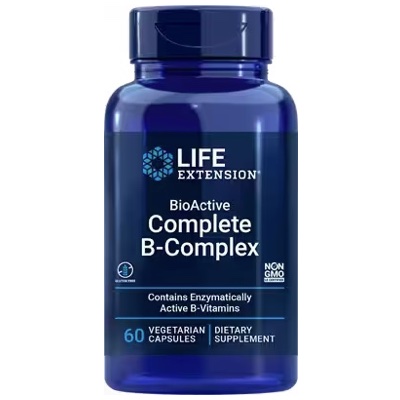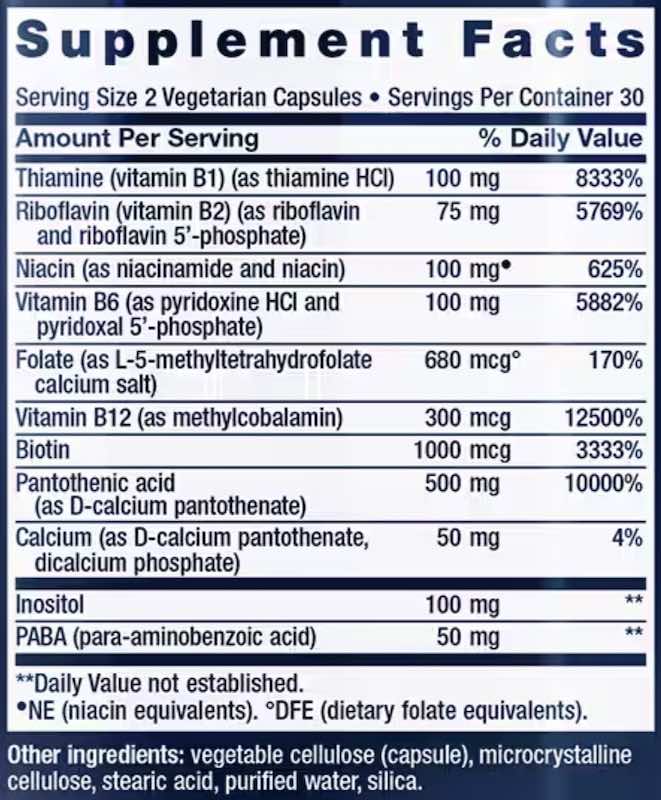The human body requires B-vitamins to utilize carbohydrates, fats, proteins, and other nutrients to generate energy. Without sufficient B-vitamins, the body lacks energy. Additionally, B-vitamins aid in DNA production and cell reproduction. In this article, we will discuss other important functions of B-vitamins and the recommended daily intake. If your body lacks B-vitamins, you can supplement with a vitamin B complex.
There are a total of eight B-vitamins. Some vitamin B complex supplements contain all eight B-vitamins, while others provide only a few. Some also include additional nutrients like choline and inositol. Below, we will introduce five recommended vitamin B complex supplements.
- Brief Comparison of 5 Vitamin B Complex Supplements
- 1. Care/of: Comprehensive B-Vitamin Formula
- 2. Nature’s Bounty: Vitamin B+C Formula
- 3. Life Extension: High-Dose B Vitamin Formula
- 4. Garden of Life: Whole Food Source B-Complex Formula
- 5. Pure: Liquid B-Complex Formula
- Benefits and Potential Side Effects
- Recommended Intake of B-Complex Vitamins
- High-risk Groups for Vitamin B Deficiency
- Detailed Explanation of 10 Common B-Complex Vitamins
Brief Comparison of 5 Vitamin B Complex Supplements
| Care/of | Nature’s Bounty | Life Extension | Garden of Life | Pure |
|---|---|---|---|---|
| Full Formula | B+C Complex | High Potency | Food-sourced | Liquid Formula |
| Capsules 30 capsules 1 per day | Tablets 150 tablets 1 per day | Capsules 60 capsules 2 per day | Capsules 60/120 capsules 2 per day | Liquid
140 ml 5 ml daily |
| $13.00 | $14.19 | $8.00 | $16.79 | $35.70 |
| 6 B-Vitamins* | ||||
| B7 / Biotin B9 / Folate | ||||
| Choline
Inositol | Vitamin C | Inositol | ||
| Third-party tested | ||||
| Suitable for vegetarians |
**Vitamin B12, Thiamin, Riboflavin, Niacin, Vitamin B6, and Pantothenic Acid
1. Care/of: Comprehensive B-Vitamin Formula
Care/of is a provider of non-GMO, sugar-free, and gluten-free vitamins. Care/of B-vitamin complex Each capsule contains 10 mg of vitamin B2, 15 mg of vitamin B6, and 120 mcg of vitamin B12. The product is third-party tested and aids in energy enhancement, supports the nervous system, and promotes healthy metabolism. Suitable for vegetarians.
Take 1 capsule daily with food and water.
| Ingredients | Amount per Serving |
|---|---|
| Vitamin B1
Thiamin | 12 mg |
| Vitamin B2
Riboflavin | 10 mg |
| Vitamin B3
Niacin | 45 mg |
| Vitamin B5
Pantothenic Acid | 45 mg |
| Vitamin B6
Pyridoxine | 15 mg |
| Vitamin B7
Biotin | 30 mcg |
| Vitamin B9
Folic Acid | 240 mcg |
| Vitamin B12
Cyanocobalamin | 120 mcg |
| Choline | 60 mg |
| Inositol | 8 mg |
2. Nature’s Bounty: Vitamin B+C Formula
Nature’s Bounty’s complex of Vitamin B includes all eight B vitamins along with Vitamin C, supporting heart, nervous system, and immune health. It also provides relief and regulation for occasional stress, mood swings, and fatigue in daily life. Other ingredients include cellulose and calcium carbonate. The product is gluten-free, sugar-free, non-GMO, and suitable for vegetarians, as confirmed by third-party testing.
Take 1 tablet daily, preferably with food.
| Ingredients | Amount per serving |
|---|---|
| Vitamin B1
Thiamine | 25 mg |
| Vitamin B2
Riboflavin | 20 mg |
| Vitamin B3
Niacin | 25 mg |
| Vitamin B5
Pantothenic Acid | 5.5 mg |
| Vitamin B6
Pyridoxine | 5 mg |
| Vitamin B7
Biotin | 1,000 mcg |
| Vitamin B9
Folic Acid | 666 mcg |
| Vitamin B12
Cyanocobalamin | 100 mcg |
| Vitamin C | 60 mg |
3. Life Extension: High-Dose B Vitamin Formula
Life Extension’s complex of Vitamin B contains all eight B vitamins, with an additional inclusion of Choline. Compared to other products, this product has higher levels of B vitamins.
Life Extension’s complex of B vitamins utilizes a combination formula called “BioActive,” which enhances the bioavailability and utilization of B vitamins in the body. The product is suitable for vegetarians, gluten-free, non-GMO, and designed to help increase energy, promote healthy metabolism, and support brain, cellular, and organ health.
Take 2 tablets daily, preferably with food.
| Ingredients | Amount per serving |
|---|---|
| Vitamin B1
Thiamine | 100 mg |
| Vitamin B2
Riboflavin | 75 mg |
| Vitamin B3
Niacin | 100 mg |
| Vitamin B5
Pantothenic Acid | 500 mg |
| Vitamin B6
Pyridoxine | 100 mg |
| Vitamin B7
Biotin | 1,000 mcg |
| Vitamin B9
Folate | 680 mcg |
| Vitamin B12
Cyanocobalamin | 300 mcg |
| Inositol | 100 mg |
4. Garden of Life: Whole Food Source B-Complex Formula
If you prioritize supplements derived from whole foods, Garden of Life’s “Life Garden” complex of Vitamin B is a great choice. Many supplement brands don’t disclose the sources of their vitamins, but Garden of Life’s ingredients come exclusively from an organic food blend that includes 23 organic fruits and vegetables, such as broccoli and spinach. The product provides all eight B vitamins, meeting the daily needs of most individuals. Additionally, the Vitamin B12 in the product is in the highly absorbable form of Methylcobalamin.
Take 2 tablets daily, before or after meals.
This supplement is certified vegan, non-GMO, and NSF gluten-free. It has undergone independent third-party testing. It helps boost physical energy, promotes heart and blood health, and supports a healthy response to stress. In addition to the organic food blend, this supplement also includes active probiotics and enzymes to support a healthy digestive system, although this may not be suitable for everyone. The capsules can be opened, and the contents can be added to water or juice. The product is not intended for children.
| Ingredients | Amount per serving |
|---|---|
| Vitamin B1
Thiamin | 5 mg |
| Vitamin B2
Riboflavin | 10 mg |
| Vitamin B3
Niacin | 45 mg |
| Vitamin B5
Pantothenic Acid | 45 mg |
| Vitamin B6
Pyridoxine | 10 mg |
| Vitamin B7
Biotin | 325 mcg |
| Vitamin B9
Folate | 450 mcg |
| Vitamin B12
Cyanocobalamin | 133 mcg |
| Organic Fruit and Vegetable Blend:
All ingredients are organic: Apple, Beet Root, Broccoli, Carrot, Spinach, Tomato, Strawberry, Tart Cherry, Blackberry, Green Bell Pepper, Brussels Sprout, Blueberry, Ginger, Garlic, Green Onion, Raspberry, Cilantro, Cauliflower, Red Cabbage, Cabbage, Celery, Asparagus. | 360 mg |
| Probiotic and Enzyme Blend:
Lipase, Protease, Fungal Protease, β-Glucanase, Cellulase, Bromelain, Phytase, Lactase, Papain, Peptidase, Pectinase, Hemicellulase, Xylanase, Lactobacillus (Bulgaricus and Plantarum) | 60 mg |
5. Pure: Liquid B-Complex Formula
Pure Encapsulations Liquid B-Complex, ideal for those who dislike or have difficulty swallowing pills and capsules.
This supplement contains six B vitamins: Vitamin B12, Thiamin, Riboflavin, Niacin, Vitamin B6, and Pantothenic Acid. It supports normal nervous system function and helps convert carbohydrates into energy. It does not contain Biotin or Folate, so if there is a need for additional Folate supplementation, such as during pregnancy, it should be supplemented separately.
This complex of B vitamins is flavored with juice concentrates and stevia, making it taste pleasant. It is made from high-quality vegetarian ingredients supported by verifiable science and has Vegetarian certification (not Vegan). However, it contains an ingredient called Xanthan Gum, which may not meet the “vegan” standards due to its production environment.
Take 1 teaspoon (5 ml) daily after a meal.
Pure Encapsulations is a company that develops and manufactures high-quality nutritional supplements, including various vitamins, minerals, and plant extracts. Pure Encapsulations’ vitamin products rank highly in various evaluations and most have undergone third-party testing. All products are free from gluten, artificial colors, and flavors.
| Ingredients | Amount per serving |
|---|---|
| Vitamin B1
Thiamin | 3.5 mg |
| Vitamin B2
Riboflavin | 3 mg |
| Vitamin B3
Niacin | 10 mg |
| Vitamin B5
Pantothenic Acid | 10 mg |
| Vitamin B6
Pyridoxine | 4 mg |
| Vitamin B12
Cyanocobalamin | 500 mcg |
Benefits and Potential Side Effects
B-Complex vitamins may help reduce stress, improve cognitive function, and alleviate symptoms of depression and anxiety. These benefits are not limited to individuals with B vitamin deficiencies and can also be helpful for those without deficiencies.
1. Stress and Chronic Fatigue
Research results have shown that B-complex vitamins can significantly improve mood and reduce physiological responses to stress. For individuals with chronic fatigue syndrome (CFS), B-complex vitamins are often part of nutritional therapy to help alleviate symptoms.
A study conducted in 2010 evaluated the effects of B-complex vitamins on cognitive and emotional aspects in 215 full-time working men aged 30-55. After 33 days of observation, the study found that high-dose B-complex vitamin supplements can improve stress, enhance mental health, and improve cognitive performance during intense mental processing. [1] Trusted Website NCBI, US National Center for Biotechnology Information, is a trusted source of biotechnology and biomedicine information. Open the link →
2. Alleviating Anxiety or Depression
While B-complex vitamin supplements cannot replace the treatment of mental health disorders, they may help alleviate symptoms of depression or anxiety.
- A study involving 60 adult patients with depression showed that taking B-complex vitamins for 60 consecutive days significantly improved symptoms of depression and anxiety compared to a placebo. [2] Trusted Website NCBI, US National Center for Biotechnology Information, is a trusted source of biotechnology and biomedicine information. Open the link →
- Another study found that supplementation with vitamins containing B12, B6, and folate can achieve sustained and significant antidepressant effects within one year. [3] Trusted Website PubMed is a data base from US National Institutes of Health. It’s a trusted source of health and medical information. Open the link →
- Research has shown that low intake of some B-complex vitamins, including B12, B6, and folate, may increase the risk of depression. Therefore, if symptoms of depression occur, it is important to first rule out nutritional deficiencies. [4] Trusted Website NCBI, US National Center for Biotechnology Information, is a trusted source of biotechnology and biomedicine information. Open the link →
3. Healthy Brain Function
B-complex vitamins play an important role in maintaining normal brain function. Adequate intake of B-complex vitamins is essential for optimal physiological and neurological functions.
Some data suggest that B-complex vitamins, particularly vitamin B6, may play a key role in preventing neurodegenerative diseases like Parkinson’s disease. [5] Trusted Website PubMed is a data base from US National Institutes of Health. It’s a trusted source of health and medical information. Open the link →
4. Potential Side Effects
Excessive intake of vitamin B3 (niacin) may cause vomiting, increased blood sugar levels, skin flushing, and even liver damage. High-dose vitamin B6 can potentially cause nerve damage, photosensitivity, and skin irritation. B-complex vitamins are water-soluble, so it is unlikely to overdose on them through daily diet or following the recommended dosage of B-complex vitamin supplements.
Another side effect of B-complex vitamins is that they may cause the urine to turn bright yellow. This is the body excreting excess vitamins that cannot be utilized.
Recommended Intake of B-Complex Vitamins
Each B-complex vitamin has a specific Recommended Dietary Allowance (RDA) that varies depending on biological sex, age, and other factors such as pregnancy. Pregnant and breastfeeding individuals require higher intake of B-complex vitamins, while infants and children have lower requirements. It is advisable to consult a doctor to determine the appropriate supplement dosage based on age and health condition.
Daily Recommended Intake of B-Complex Vitamins for Adults (19+)
| Vitamins | Male | Female | Pregnant | Breast Feeding |
|---|---|---|---|---|
| Vitamin B1 Thiamin | 1.2 mg | 1.1 mg | 1.4 mg | 1.4 mg |
| Vitamin B2 (Riboflavin) | 1.3 mg | 1.1 mg | 1.4 mg | 1.6 mg |
| Vitamin B3 Niacin | 16 mg | 14 mg | 18 mg | 17 mg |
| Vitamin B5 Pantothenic Acid | 5 mg* | 5 mg* | 6 mg* | 7 mg* |
| Vitamin B6 Pyridoxine | 1.3 mg | 1.3 mg | 1.9 mg | 2.0 mg |
| Vitamin B7 Biotin | 30 mcg* | 30 mcg* | 30 mcg* | 35 mcg* |
| Vitamin B9 Folate | 400 mcg | 400 mcg | 600 mcg | 500 mcg |
| Vitamin B12 Cobalamin | 2.4 mcg | 2.4 mcg | 2.6 mcg | 2.8 mcg |
* AI: Adequate Intake. Recommended Dietary Allowance (RDA) represents the nutrient intake level required to maintain health and normal function, while Adequate Intake (AI) is a reference value used when there is insufficient scientific evidence to establish an RDA.
High-risk Groups for Vitamin B Deficiency
Many foods contain B-complex vitamins, and deficiencies are unlikely to occur with a balanced diet. However, certain situations can increase the body’s demand for B-complex vitamins, such as pregnancy, illness, surgery, genetics, medications, dietary restrictions, and age, which can affect the absorption and utilization of B-complex vitamins.
1. Pregnant or lactating individuals
During pregnancy, the demand for B-complex vitamins, particularly B12 and folate, increases because these nutrients are essential for fetal development. It is important for pregnant or lactating individuals, especially those following vegetarian or strict vegan diets, to supplement with B-complex vitamins. Deficiency in B12 or folate during pregnancy or lactation can lead to neural damage or birth defects in the fetus or infant. [6] Trusted Website NCBI, US National Center for Biotechnology Information, is a trusted source of biotechnology and biomedicine information. Open the link →
2. Seniors
- It is estimated that 10-30% of individuals over 50 years old have insufficient stomach acid to adequately absorb B12. [7] Trusted Website NCBI, US National Center for Biotechnology Information, is a trusted source of biotechnology and biomedicine information. Open the link →
- B12 deficiency has been associated with depression and mood fluctuations in older adults. [8] Trusted Website NCBI, US National Center for Biotechnology Information, is a trusted source of biotechnology and biomedicine information. Open the link →
- Deficiencies in vitamin B6 and folate are also common in older adults. [9] Trusted Website PubMed is a data base from US National Institutes of Health. It’s a trusted source of health and medical information. Open the link →
3. Individuals with specific diseases
Certain diseases such as malabsorption disorders, cancer, Crohn’s disease, alcohol dependence, hypothyroidism, and anorexia nervosa can increase the risk of nutrient deficiencies, including B-complex vitamins. Additionally, MTHFR gene mutations may affect the body’s metabolism of folate, leading to folate deficiency.
4. Vegetarians
Vitamin B12 is primarily found in animal products such as meat, dairy, eggs, and seafood. Vegetarians who do not obtain sufficient B12 through fortified foods or supplements are at risk of deficiency. Daily supplementation with a B-complex vitamin can help these individuals meet their nutritional needs. [10] Trusted Website NCBI, US National Center for Biotechnology Information, is a trusted source of biotechnology and biomedicine information. Open the link →
5. Individuals taking certain medications
- Proton pump inhibitors, which reduce stomach acid, can affect the absorption of B12.
- Common diabetes medication, metformin, may lead to decreased levels of B12 and folate.
- Birth control pills can deplete certain B-complex vitamins, including B6, B12, folate, and riboflavin.
Detailed Explanation of 10 Common B-Complex Vitamins
The following lists all eight B-complex vitamins, as well as two common components, choline and inositol, their health benefits, food sources, and symptoms associated with deficiencies. The information is compiled from the National Institutes of Health (NIH).
Vitamin B 1 / Thiamin
Thiamin (Vitamin B1) plays an important role in metabolism and helps convert nutrients into energy. Foods rich in thiamin include pork, sunflower seeds, and wheat germ.
Health Benefits
- Boosting energy: When sugar combines with thiamin, it becomes energy that your body can use.
- Reducing the impact of sepsis: Thiamin and vitamin C can reduce the impact of sepsis and lower the risk of kidney failure caused by infections.
- Aiding in depression: Thiamin can help alleviate symptoms of depression and stabilize mood. Thiamin deficiency is also associated with low mood.
- Beneficial for diabetes: Research suggests that after taking thiamin for six weeks, blood sugar and insulin levels may improve. Thiamin also helps reduce high blood pressure and cardiovascular complications in diabetes patients.
- Preventing kidney and circulatory issues: Thiamin and vitamin B12 can help improve neuropathy in diabetes patients and may reduce the need for painkillers.
- Lowering the risk of heart disease: Thiamin is crucial for producing acetylcholine, which helps transmit signals between nerves and muscles. Without this communication, the heart cannot function properly. Thiamin deficiency is one of the causes of imbalanced heart function.
- Enhancing memory: Adequate thiamin intake can help improve attention and memory. Due to its positive impact on brain function, thiamin is also known as the “morale vitamin.”
Food Sources
- Whole grains and fortified bread, cereals, pasta, and rice
- Pork
- Trout
- Clams
- Acorns
- Pumpkin
- Legumes, such as black beans and soybeans
- Seeds
- Nuts
Thiamine Deficiency Symptoms
Early symptoms include: headaches, fatigue, irritability, depression, and abdominal discomfort.
Extremely low levels of thiamine can lead to:
- Beriberi
- Decreased appetite
- Muscle weakness
- Toe pain and burning sensation on the soles of the feet
- Rapid heartbeat
- Low blood pressure
- Fluid retention
- Brain problems
Vitamin B2 / Riboflavin
Riboflavin helps convert food into energy and also acts as an antioxidant. The richest food sources include organ meats, beef, and mushrooms.
Health benefits
- Energy production
- Assisting in the breakdown of fats, drugs, and steroid hormones in the body
- Converting tryptophan into niacin (vitamin B-3)
- Converting vitamin B-6 into coenzymes needed by the body
Food sources
- Organ meats
- Fortified breakfast cereals
- Oatmeal
- Yogurt and milk
- Mushrooms
- Almonds
Riboflavin Deficiency
Riboflavin deficiency is relatively rare, but it may occur when a person has endocrine disorders such as thyroid problems.
Riboflavin deficiency may present the following symptoms:
- Skin disorders
- Angular stomatitis
- Swelling in the mouth and throat
- Swollen and cracked lips
- Hair loss
- Red, swollen, and itchy eyes
Severe riboflavin deficiency can also lead to anemia and cataracts. During pregnancy, riboflavin deficiency may increase the risk of certain birth defects.
Vitamin B3 / Niacin
Niacin plays an important role in cell signaling, metabolism, and the production and repair of DNA. Food sources include chicken, tuna, and lentils.
Health benefits
The body converts niacin into a coenzyme called nicotinamide adenine dinucleotide (NAD). NAD is essential in over 400 different enzyme reactions in the body. These enzymes help:
- Convert energy from carbohydrates, fats, and proteins into forms the body can use
- Support the metabolic processes within cells
- Communication between cells
- Expression of DNA within cells
Food sources
Animal-derived foods such as meats, poultry, and fish are rich in NAD, which is easily absorbed and utilized by the human body.
Plant-based foods like nuts, legumes, and grains also contain niacin, but this natural form of niacin is not easily absorbed by the body. However, food manufacturers fortify foods like grains with niacin in a form that is readily absorbed and utilized by the body.
Niacin Deficiency
Severe niacin deficiency can lead to pellagra, a condition that may present the following symptoms:
- Brown discoloration of the skin
- Rough patches on the skin
- Bright red tongue
- Vomiting, diarrhea, or constipation
- Headaches
- Fatigue
- Depression
If left untreated, pellagra can also result in severe memory problems, behavioral changes, and even suicidal tendencies. It can also cause extreme loss of appetite or death.
Vitamin B5 / Pantothenic Acid
Like other B vitamins, pantothenic acid helps the body obtain energy from food and is also involved in hormone and cholesterol production. Good sources of pantothenic acid include liver, fish, yogurt, and avocados.
Health benefits
Pantothenic acid is necessary for the body to create new coenzymes, proteins, and fats. Red blood cells transport pantothenic acid throughout the body so that it can be used in various energy and metabolic processes.
Food sources
The following foods have the highest levels of pantothenic acid:
- Beef liver
- Shiitake mushrooms
- Sunflower seeds
- Chicken
- Tuna
- Avocado
- Fortified breakfast cereals
Pantothenic acid deficiency
- Numbness and burning sensation in hands and feet
- Headaches
- Irritability
- Restlessness and poor sleep quality
- Loss of appetite
Vitamin B6 / Pyridoxine
Vitamin B6 plays an important role in amino acid metabolism, red blood cell production, and the synthesis of neurotransmitters. Foods rich in this vitamin include chickpeas, salmon, and potatoes.
Health benefits
Vitamin B6 is involved in over 100 enzyme reactions in the body. The body needs vitamin B6 for:
- Amino acid metabolism
- Breakdown of carbohydrates and fats
- Brain development
- Immune function
Food sources
- Animal organs
- Chickpeas
- Tuna
- Salmon
- Poultry
- Potatoes
- Fortified cereals
Vitamin B6 Deficiency
Vitamin B6 deficiency is associated with reduced levels of vitamin B12.
Vitamin B6 deficiency can cause the following issues:
- Anemia
- Cracked lips
- Corner of the mouth cracks
- Swollen tongue
- Impaired immune system
- Confusion
- Depression
Vitamin B7 / Biotin
Biotin is crucial for carbohydrate and fat metabolism. Yeast, eggs, salmon, cheese, and liver are excellent food sources of biotin.
Health benefits
The body needs biotin to:
- Break down fats, carbohydrates, and proteins
- Transmit information between cells
- Regulate DNA
Many hair, skin, and nail products contain added biotin. However, according to NIH, there is currently insufficient evidence to prove that consuming biotin improves hair, skin, or nails.
Food sources
- Organ meats
- Eggs
- Salmon
- Pork
- Beef
- Sunflower seeds
Biotin Deficiency
Symptoms include:
- Thinning hair
- Scaly rash around the eyes, nose, and mouth
- Fragile nails
- Depression
- Fatigue
Vitamin B9 / Folate
Vitamin B9, in its natural form, is called folate. Folic acid is the synthetic form of vitamin B9 used in fortification of foods and supplements. Folate plays an important role in cell growth, amino acid metabolism, red and white blood cell formation, and normal cell division. Foods such as leafy greens, liver, and legumes are food sources of folate.
Health benefits
Since most people cannot consume enough leafy greens to meet the required folate levels for pregnancy, the CDC recommends that all women of childbearing age who are planning to become pregnant consume 400 micrograms of folate per day, and their diet should include rich folate foods.
When women have adequate folate levels before and during pregnancy, the risk of the fetus developing neural tube defects is reduced.
Folate is also crucial for the following:
- DNA replication
- Vitamin metabolism
- Amino acid metabolism
- Proper cell division
Food sources
The FDA requires manufacturers to add folate to standardized fortified cereal products to help reduce the risk of neural tube defects.
Natural folate is also found in the following foods:
- Dark leafy green vegetables
- Beef liver
- Avocado
- Papaya
- Orange juice
- Eggs
- Legumes
- Nuts
Folate Deficiency
Folate deficiency can cause the following symptoms:
- Weakness
- Headaches
- Palpitations
- Irritability
- Tongue or mouth ulcers
- Changes in skin, hair, or nails
Vitamin B12 / Cobalamin
Vitamin B12 is essential for neurological function, DNA synthesis, and red blood cell development. Natural sources of vitamin B12 can be found in animal-based foods such as meat, eggs, seafood, and dairy products.
Health benefits
The body uses vitamin B12 for the following functions:
- Production of new red blood cells
- DNA synthesis
- Brain and nervous system function
- Fat and protein metabolism
Food sources
Vitamin B12 naturally occurs in animal products such as:
- Clams
- Beef liver
- Salmon
- Beef
- Milk and yogurt
Individuals who do not consume animal products may need to obtain vitamin B12 through supplements or fortified foods like breakfast cereals and nutritional yeast.
Vitamin B12 Deficiency
Vitamin B12 deficiency typically leads to megaloblastic anemia. Symptoms of vitamin B12 deficiency may include:
- Fatigue
- Weight loss
- Constipation
- Decreased appetite
- Numbness and tingling in hands and feet
- Memory problems
- Depression
Vegetarians and individuals who are pregnant or breastfeeding may need additional supplementation of vitamin B12.
Choline
Choline is an essential nutrient for the human body. The brain and nervous system require choline to regulate memory, mood, muscle control, and other functions. While the liver produces a small amount of choline in the body, it is not enough to meet daily needs. The richest sources of choline are meat, fish, poultry, dairy products, and eggs.
Health benefits
- Improves memory and cognition.
- Protects heart health, as individuals with higher choline intake have a lower risk of ischemic stroke.
- Boosts metabolism.
- Reduces the risk of complications during pregnancy.
- Improves symptoms of cystic fibrosis.
- Alleviates symptoms of fatty liver.
Food sources
- Beef, beef liver
- Egg yolks
- Chicken breast
- Fish
- Shiitake mushrooms
- Potatoes
- Legumes (beans, peanuts)
- Milk
- Yogurt
- Cruciferous vegetables (broccoli, cauliflower, Brussels sprouts, cabbage)
- Sunflower seeds
Choline Deficiency
Choline deficiency may lead to the following health issues:
- Cardiovascular diseases
- Neurological diseases, such as Alzheimer’s disease
- Non-alcoholic fatty liver disease
- Neural tube defects
- Muscle damage
While choline deficiency can have adverse health effects, excessive intake of choline can also cause problems, including:
- Low blood pressure
- Excessive sweating
- Vomiting
- Excessive salivation
- Hepatotoxicity
- Fishy body odor
Inositol
Inositol, often referred to as Vitamin B8, is not actually a vitamin but a sugar with multiple important functions. Inositol can influence the behavior of insulin and may also have supportive effects on mental health and metabolic disorders, including diabetes.
Health benefits
- Inositol may have positive effects on mental health. It may help improve symptoms of depression, bipolar disorder, and other conditions. [11] Trusted Website PubMed is a data base from US National Institutes of Health. It’s a trusted source of health and medical information. Open the link →
- Some clinical studies suggest that inositol may help control risk factors for metabolic syndrome. Oral inositol appears to improve insulin resistance, cholesterol, triglycerides, and blood pressure in individuals with metabolic syndrome. [12] Trusted Website NCBI, US National Center for Biotechnology Information, is a trusted source of biotechnology and biomedicine information. Open the link →
- Research indicates that inositol may improve symptoms of polycystic ovary syndrome (PCOS), especially when used in conjunction with folate. It may help women with hormonal imbalances improve irregular menstrual cycles and infertility. Evidence suggests that oral inositol may have a positive therapeutic effect on improving ovulation and pregnancy rates. [13] Trusted Website PubMed is a data base from US National Institutes of Health. It’s a trusted source of health and medical information. Open the link →
- Taking inositol and folate orally during pregnancy may help prevent gestational diabetes and reduce the risk of preterm birth. [14] Trusted Website PubMed is a data base from US National Institutes of Health. It’s a trusted source of health and medical information. Open the link →
The average daily intake of inositol in a regular diet is approximately 1 gram. It can be found in sources such as grains, legumes, nuts, fresh fruits, and vegetables. The body can also produce inositol from the carbohydrates consumed.
While inositol is generally well accepted and utilized by the body, mild side effects may occur with daily intakes of 12 grams or higher. These side effects may include nausea, bloating, difficulty sleeping, headaches, dizziness, and fatigue.
Disclosure: We are an Amazon Associate. Some links on this website are affiliate links, which means we may earn a commission or receive a referral fee when you sign up or make a purchase through those links.






















Leave a Reply